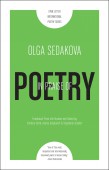In Praise of Poetry by Olga Sedakova
by Open Letter / December 19, 2014 / 1 Comment
I have been making up poems since before I can remember. My mother wrote to my father—in China, I believe—telling him how I was learning to speak in rhyme, and she added: “Maybe she’ll be a poet.” When secretly reading other people’s letters (something I swear I have not done for a long time), I was never able to make them out in full, through to the end. Something like a surge of conscience would tug them away from my eyes like a third hand, and a kind of fear would rearrange the letters. And so I could read only the rhyme: “Nina—seen her.”

- In Praise of Poetry is an introduction to the work of Olga Sedakova, one of Russia’s most respected and renowned poets. The collection combines a memoir-essay written about her development as a poet with two long-form poems: “Tristan and Isolde” and “Old Songs.” This book was translated from Russian and edited by Caroline Clarke, Ksenia Golubovich and Stephanie Sandler.
- Until the 1990s, Olga Sedakova’s books were not available in Russia because they failed to align with prescribed official aesthetics. Her collections were passed in hand-written copies from one reader to the next. She is now the author of twenty-seven works of poetry and prose. Open Letter‘s publication of In Praise of Poetry is the first time her work has appeared in translation.
Unlike my young mother, I know that children often learn words through rhyme and that this has nothing to do with poetry. I find the idea of poets having a predominantly aural awareness to be exaggerated (“For the poet only sound is important,” as is often quoted
from Trediakovsky). And I consider the call to
Evoke as sound in my heart
What you cannot express in words
to be a most cunning means of retreat. But I will tell you later on, when the time comes, what I think about poetry.
My sister Irina had either not yet been born or had only just been born. In one of the first poems that I remember, it was the discrepancy between reality and the way I represented it that assured the poem’s success among adults:
Spring has come
To us in the yard.
My sister has climbed
Up onto the fence.
(Then I used my hands and feet, rather than words, to show how she “fell off the fence and ended up in a hole.”)
Oh where am I?
And where’s my yard?
And where’s my spring?
And where’s my fence?
Here is another poem from my preschool years:
Not being a person
I then thinked:
What do we need these rivers for
And why is there water in them?
But being a person,
I now think:
We do need these rivers
And the water in them too.
I don’t know what I meant by “Not being a person.” Being who exactly? But I could see those rivers, regardless of the water, as clearly then as I do now. I understood that the repetition must be total, or rather: any one thing that happens must be sure to involve everything else mentioned. And so, with the fence lost and gone, spring would just have to disappear too. The world is nowhere as whole as in stanzaic form. Elena Shvarts also writes about this:
Bind now this whole world
with a chain of similes,
otherwise it will melt
and fade into the soundless ether.
It never seemed to me that anything depended on similes alone or on poetry in general. On the contrary, I saw poetry as an infinitely dependent thing, almost completely expended by its dependency— but on what? On the disposition of the stars, the condition of one’s liver, a rumbling underground? I cannot say. I love the fateful in poetry, although you may be surprised to hear which lines I find particularly fateful. For example:
Midst golden fields and greenest pastures
The lake spreads blue and broad;
Across its unknown waters
A fisherman drifts . . .
Perhaps because this is no longer a lake but the sky, or because there is nothing like this on earth, nor could there ever be—and yet this is all there is. In short, I cannot say why these lines used to make me hysterical. I would have the urge to break something, if only a dish. I could see the fate “of Sophocles, not of Shakespeare” (as Akhmatova said on quite a different occasion) descending upon us like a bird of prey, perhaps like the eagle to Ganymede, with this blue, green and gold landscape of the Unknown. To me, fully incarnate poems are fateful.
But despite making up rhymes all through my school years, the strange thing is that I had no idea about the inexpressible content that compels one to be a poet. It was pure poetastery, graphomania without the slightest inspiration, without a hint of simple sincerity. I never wrote about what excited me: I did not think this was allowed. For me the words “allowed” and “not allowed” decided everything. Anything that was not allowed was hateful and not to be desired. While doing my schoolwork I would place a portrait of Lenin in front of me. I needed a supervisor, better still—the author of those orders I was performing, for only the author could appraise my performance and reward me with his approval. Without any real or imagined praise (in the way, for example, this gilded portrait changed his expression) I would not do anything. In addition to having these traits of a fawner and prig, so unnatural for a poet, there was one more. I was inarticulate and unable to construct grammatically coherent sentences. Many people lack this ability, but not to such an extent. Alarmed by my severe inability to “express thoughts,” my parents would make me paraphrase books. This did not help: I simply learned whole paragraphs and sections by heart and repeated them. In the meantime a grammatical idiocy flourished. I found constructing my own normal sentences somewhat crude and dishonest, as if by articulating the theme and rheme and connecting everything by case and number, I was slipping into someone else’s dress—and an ugly one at that. Many people feel ill at ease when hearing inflated or stilted language, but for me all connected speech was inflated in this way.
And so, sincerity and plausibility in poems were not to be “allowed.” Anyone who understands the full force of this word will know that asking why can have no bearing here. I do not wish to justify my graphomania, but at the heart of this delusion lies good sense. There is, I feel, a type of sincerity or truth about oneself that when professed becomes a slander against the whole world. The spoken and heard word does not exist in order to articulate, repeat or, still less, reveal anything—and this includes the one speaking it. This word—by virtue of its own sound and its unpredictable ability to mean something else, something more than that with which it is to be entrusted—strives to enrobe. I need not, of course, explain to you that to enrobe is not to mask or refresh the paint on the whited sepulchers; it is not to conceal something truly bad under an unreal or pseudo-real goodness. Let us agree that we know what it is to enrobe. Otherwise I fear I shall become another author of Selected Passages failing, at that, to write my “Government Inspector.”
True, there was one exception to this exemplary insincerity: before going to sleep I would make up poems about death, but I never wrote them down or considered them to be poems. The idea of death first entered my head when I was about seven, in the first grade. It was not a thought, but a hole, not in my head or in my chest, but somewhere in my stomach. Once there, this hole settled inside my consciousness and from time to time everything would be drawn into it with a whistling sound, and there would be nothing left behind. I do not know where it came from—maybe general talk about a nuclear war. I understood that this thought was somehow unseemly and did not speak of it. Immortality, something I had heard about in passing, did not blot out this thought and did not command that same force of tangible presence as “death,” “never,” and particularly “never again.” I had also heard of paradise, which to me was like a cherry tree that, like those rivers without water, was made up only of the marks and features of a cherry tree. And paradise related to everything that was other than death—a thing that, even in all its entirety, paradise could not outweigh. This Arzamas terror persisted for months and eventually ended of its own accord. Having observed my dreadful unprovoked fits of crying a hundred times a day, my grandmother asked an old woman from the church to come, and together they said some prayers and sprinkled holy water over me. They were probably exorcising demons—the midnight and midday demons of mortal despair. Maybe it ended because the holidays were over and there was no time for that sort of thing at school. But when the fear did come over me, I would hush it and, before going to sleep, make up lines that I did not think of as poetry and that, for some reason, calmed me:
In this cold country
It will be cold.
Then everyone will forget about me
And I will forget where the people are.
They calmed me in that they proved to be at least somehow effable. I learned only many years later that before writing a poem (whatever the subject and however sunny the words and resonance of the words may be) one must have the same sense of fear as when faced with this chilling lullaby. The same, and yet, not exactly the same, of course. . .
Sampsonia Way reproduced this excerpt with the permission of Open Letter Books. Copyright Open Letter Books, 2014.






One Comment on "In Praise of Poetry by Olga Sedakova"
It is quite nice to read this article. I also think ”death” is a gloomy matter. Birth first, aging, and death later. This is a natural phenomenon every man has to face. As a poet myself I also assume myself as an interpreter of things, experience and events.